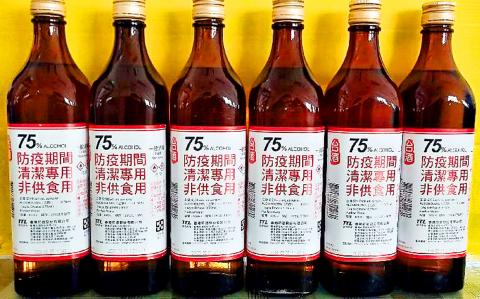Keeping living spaces clean and sanitary is an important part of preventing the spread of COVID-19 alongside diligent hand washing and using sanitizer, Taichung Veterans General Hospital physician Chen Po-yan (陳伯彥) said on Monday.
SARS-CoV-2, the virus that causes COVID-19, is spread through respiratory droplets or through contact with a contaminated surface, Chen said.
Due to the risk of infection through contact with surfaces, hand washing immediately after the removal of outdoor clothing and footwear is important to avoid the risk of spreading the virus in the home, he said.

Photo: Liu Hsiao-hsin, Taipei Times
People are advised to maintain good personal hygiene, and avoid sharing dishes and utensils, as well as regularly cleaning and sanitizing shared areas of the home, he said.
A 75 percent alcohol solution or chlorine solution can sanitize surfaces and kill SARS-CoV-2, but these materials are ineffective against noroviruses and enteroviruses, he said.
Therefore, bleach should be used to clean surfaces, he said, adding that it is especially important to sanitize surfaces that are frequently touched, such as doorknobs, toilet handles and faucets.
A 75 percent alcohol solution renders SARS-CoV-2 cells inactive, Tainan Municipal An-Nan Hospital physician Chen Hung-yu (陳泓毓) said.
However, because bleach and other chlorine solutions contain hypochlorous acid — which destroys protein structures — they can inhibit the virus’ activity, Chen Hung-yu said.
Alcohol-based sanitizers are generally more convenient to carry outside — particularly as they evaporate quickly — and so are best used for sanitizing hands and smaller items, he said.
However, soap and warm water should be used to clean blood or other body fluids from the skin, as alcohol solution is not as effective, he said.
Bleach is best for disinfecting rooms, with a ratio of 500 parts per million (ppm) sufficient for most surfaces, he said, adding that 5,000ppm could be used on particularly dirty surfaces or where blood was present.
Food-grade chlorine (sodium hypochlorite) can disinfect fresh produce, but the ratio should not exceed 100ppm and the chlorine should be washed away before consumption, he said.
Chlorine solutions should be used within 24 hours after mixing, and should be kept away from direct sunlight and high heat, he said.
As bleach and other chlorine solutions can cause skin and respiratory system reactions, contact should be kept to a minimum and avoided entirely for people with allergies, Chen Hung-yu said, adding that the solutions should be applied with a cloth, not sprayed.
People can fight viruses by supporting their immune system through proper sleep, adequate exercise and a balanced diet, he said.

Alain Robert, known as the "French Spider-Man," praised Alex Honnold as exceptionally well-prepared after the US climber completed a free solo ascent of Taipei 101 yesterday. Robert said Honnold's ascent of the 508m-tall skyscraper in just more than one-and-a-half hours without using safety ropes or equipment was a remarkable achievement. "This is my life," he said in an interview conducted in French, adding that he liked the feeling of being "on the edge of danger." The 63-year-old Frenchman climbed Taipei 101 using ropes in December 2004, taking about four hours to reach the top. On a one-to-10 scale of difficulty, Robert said Taipei 101

Nipah virus infection is to be officially listed as a category 5 notifiable infectious disease in Taiwan in March, while clinical treatment guidelines are being formulated, the Centers for Disease Control (CDC) said yesterday. With Nipah infections being reported in other countries and considering its relatively high fatality rate, the centers on Jan. 16 announced that it would be listed as a notifiable infectious disease to bolster the nation’s systematic early warning system and increase public awareness, the CDC said. Bangladesh reported four fatal cases last year in separate districts, with three linked to raw date palm sap consumption, CDC Epidemic Intelligence

Two Taiwanese prosecutors were questioned by Chinese security personnel at their hotel during a trip to China’s Henan Province this month, the Mainland Affairs Council (MAC) said yesterday. The officers had personal information on the prosecutors, including “when they were assigned to their posts, their work locations and job titles,” MAC Deputy Minister and spokesman Liang Wen-chieh (梁文傑) said. On top of asking about their agencies and positions, the officers also questioned the prosecutors about the Cross-Strait Joint Crime-Fighting and Judicial Mutual Assistance Agreement, a pact that serves as the framework for Taiwan-China cooperation on combating crime and providing judicial assistance, Liang

US climber Alex Honnold left Taiwan this morning a day after completing a free-solo ascent of Taipei 101, a feat that drew cheers from onlookers and gained widespread international attention. Honnold yesterday scaled the 101-story skyscraper without a rope or safety harness. The climb — the highest urban free-solo ascent ever attempted — took just more than 90 minutes and was streamed live on Netflix. It was covered by major international news outlets including CNN, the New York Times, the Guardian and the Wall Street Journal. As Honnold prepared to leave Taiwan today, he attracted a crowd when he and his wife, Sanni,